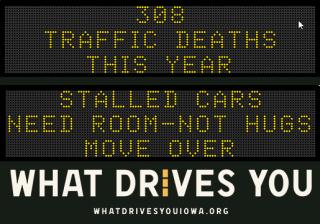We’ve all lived this driving experience: you’re cruising along and up ahead you spot a stalled vehicle on the shoulder. Maybe the emergency hazards are on, but maybe not. You have precious seconds to assess the situation and take action. What do you do? You should slow down or move over as soon as safely possible. Crowding a stalled or working vehicle, or failing to let other drivers change lanes, can create the perfect storm for collisions.
Stalled vehicles need space. Moving over is one of the simplest, yet most powerful, ways to ensure everyone gets home safely, but it takes proactive driving. To keep yourself and the person on the shoulder safe, treat a stalled car the same way you would a construction zone or a crash scene – reduce your speed and signal to move over if safe to do so.
Moving over is not just a courtesy – it’s the law. Iowa’s Move Over laws require drivers to change lanes or slow down significantly when approaching any stopped vehicle with flashing lights, whether it’s an emergency responder, a tow truck, or a single stalled vehicle.
As we wrap up National Crash Responder Safety Week, it’s critical that we remain alert when approaching all forms of traffic incident response activity, such as helping a stalled vehicle, clearing debris from the road, or responding to a crash.
This video shows us why every driver should slow down/move over.
In 2024 in Iowa, 308 people have been killed in traffic crashes. That’s an increase of seven since last Friday. In Iowa in 2023, there were 377 traffic-related deaths. To see statistics published daily by the Office of Driver Services, go to the daily fatality report at https://www.iowadot.gov/mvd/stats/daily.pdf

Comments
Submit a CommentPlease refresh the page to leave Comment.
Still seeing this message? Press Ctrl + F5 to do a "Hard Refresh".